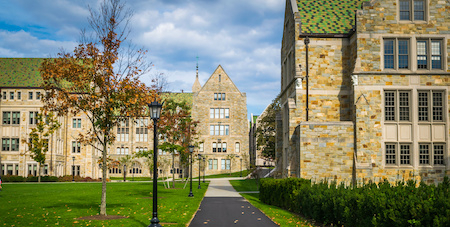Class of 2028 Early Application Deadlines
The first college application deadlines for the Class of 2028 will be here before you know it. Here are some of the early application deadlines students need to be aware of.
Updated: Monday, November 4, 2024

By Tiffany, IvyWise College Admissions Counselor
If you surveyed the participants of an average college freshmen orientation, you probably wouldn’t be surprised to learn that the incoming class has a variety of experiences and backgrounds. However, it might be surprising to learn about the growing number of students who chose to take extended time between completing high school and enrolling in a university of their choice. Deferring enrollment—typically coined a gap year—is when a student decides to forgo a traditional timeline in pursuit of a different experience.
In May 2016, the Obamas announced that their eldest daughter Malia would take a year off before heading to Harvard. For some, it was the first introduction to a concept that has existed for quite some time. Since then, the number of students choosing this path and the support provided by universities and outside entities has only grown. The first step is deciding if this option is right for you and should be quickly followed with a plan for how you’ll spend your time.
The decision to take a gap year can be quite personal, and consequently, the shape, length, mission, and experiences can vary widely. Some gap years or deferred admission decisions are compulsory, such as serving in government militaries or completing a spiritual mission. These options have distinct start and end dates with little room for customization; however, students can still use their experiences to highlight their deep dedication to a larger cause.
More common reasons behind a student’s decision to take a gap year include the need to refresh from academic burnout, gain exposure to new cultures and concepts, continue their education before committing to a field for four years, or simply mature before leaving home completely. These reasons often require some reflection and ongoing conversations, so it’s important to discuss the gap year option as a family. This can happen as early as sophomore or junior year by naturally incorporating or exploring non-traditional options alongside colleges and universities. Your school counselor can also be an important resource, as they may be able to suggest programs or opportunities.
Many high school seniors enter their final year of high school with a clear intention to defer enrollment. I would advise students in this position to continue the traditional application process, applying to college with the full support of their high school before ultimately communicating their desire to accept admission and defer enrollment to the college of their choice. In most cases, an admissions office would seek to understand why a student has made this choice and what they plan to do with their time.
In recent years, universities have embraced gap years or deferred enrollment by encouraging students to plan ahead, often facilitating the process with simple forms and guidelines. For example, one of Harvard’s 10 optional essay prompts on the Common Application for the 2022-2023 season included, “Each year, a substantial number of students admitted to Harvard defer their admission for one year or take time off during college. If you decided in the future to choose either option, what would you like to do?” Students in this position enjoy the luxury of carefully crafting an experience and addressing their goals for the gap year.
Other students come to this conclusion much later in the timeline. These students have likely completed their traditional application process and weighed their collegiate options. A small handful, unhappy with their college options, might seek a short-term experience as they repeat the application process in the fall. To these families, my advice to accept an offer of admission and request a deferred enrollment is quite similar. At IvyWise, we help students and families navigate all of these scenarios and provide comprehensive guidance on how to approach a gap year and what to do next, no matter what stage of their college admissions journey they are in.
Once the decision to pursue a gap year has been made, you should craft a plan on how to spend this time. For support, families might turn directly to the university. Several universities offer opportunities for incoming students to participate in travel, do community service projects, or complete industry internships.
For example, Princeton’s Bridge Year Program “allows incoming students to begin their Princeton experience engaged in nine months of tuition-free, University-sponsored, global service-learning and is open to all members of Princeton’s newly-admitted first-year class.” Although opportunities for similar programs vary in length, the opportunity to have an experience alongside university classmates is widely attractive.
Additionally, families may enlist the help of private companies specializing in these experiences. EF tours, known for their educational tours and student exchanges, has created specific gap year programs for students, from short-term to semester-long or even year-long programs.
Still yet, an enterprising student may craft a gap year experience uniquely their own by combining self-study, internships or jobs, or volunteer service in locations near or far. In any of these options, students pursuing a gap year should be sure to create clear goals and objectives for their time.
The decision to pursue a gap year requires careful thought and consideration in addition to planning but can ultimately set the stage for a more meaningful college experience. For many, it’s the perfect transition to life after high school. If you need expert guidance on using your gap year wisely and preparing for college, schedule an Initial Consultation with an IvyWise counselor today.

Here are the Colleges That are Open for On-Campus Visits
After more than a year without in-person college tours, some universities are reopening for on-campus visits. Visiting colleges can be a valuable opportunity for students to get a comprehensive picture of a potential best-fit school and begin envisioning themselves on campus.

Learn How Score Choice Works and Which Schools Honor It
For high school students navigating the college application process, the back-to-school season is about a lot more than starting new classes. In addition to coursework, many students are preparing all of the components of their college applications, including submitting test scores.

The word “finals” strikes fear in the hearts of most students, as it’s the culmination of a semester’s worth of work and sometimes the determining factor of a final course grade. The end of the semester can be especially distressing for first-year students, who have never taken a college-level final before. Students may not know what to expect, and the anxiety can leave many feeling lost.